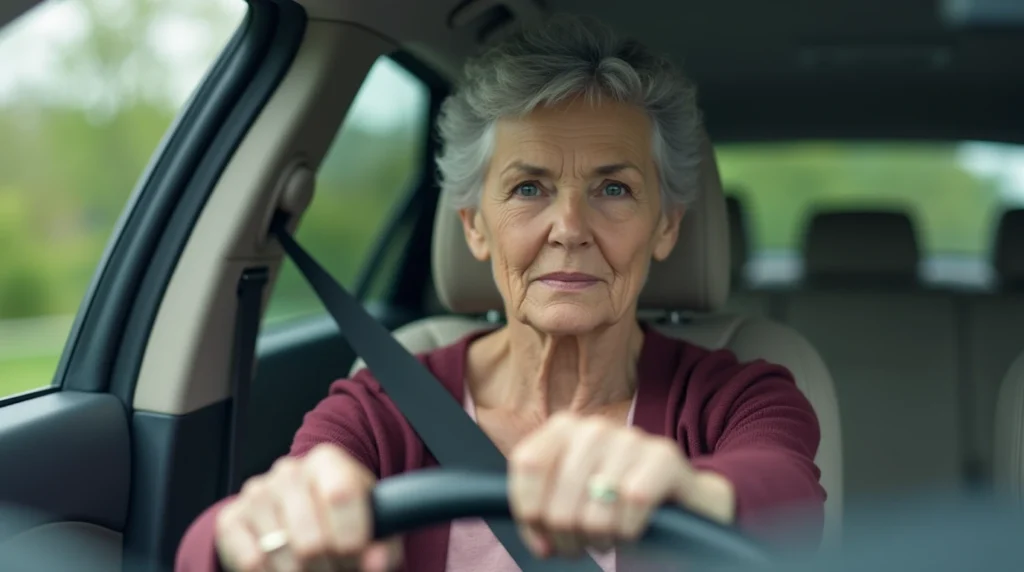Older adults with depression may be riskier drivers, according to a new study.
Research, published on December 30 JAMA Network Openfound a link between driving behaviors such as sudden braking and speeding in people over 65 and a diagnosis of major depressive disorder (MDD), a mood condition that can cause extreme sadness, hopelessness or emptiness. It’s important to note that the link held even when the researchers controlled for medications that could impair driving.
The researchers focused on the driving habits of older adults because late-life depression is a prevalent and often underdiagnosed condition that has significant consequences for this population, the study’s lead author Ganesh M. Babulal, PhD, OTDassociate professor of neurology at Washington University School of Medicine in St. Louis, said Health.
“Depression is associated with cognitive impairments, such as reduced reaction time, executive functions and divided attention, which are critical for safe driving,” Babulal said.
“As the population of older adults continues to grow, with many relying on the pursuit of independence, employment and social engagement,” he added, “understanding how depression affects driving behavior is critical to promoting safety and quality of life.”
The new research echoes previous studies examining the link between older adults’ driving behavior and mental health, including a 2018 study that found that living with depression “accelerates the onset of impaired driving in cognitively normal older adults.”
But Babulal said most existing research involves controlled conditions or self-reporting, both of which can produce inaccurate results and leave questions unanswered.
To fill the research gap, Babulal and his colleagues conducted a longitudinal study using real-world driving data. They recruited a total of 395 participants aged 65 and over, of whom 85 had been diagnosed with major depressive disorder.
From July 2021 to December 2023, vehicle data recorders measured participants’ driving behavior such as sudden braking, sudden cornering, random driving routes, speeding and distances traveled.
Participants with depression showed more frequent braking and swerving, speeding, and driving to distant destinations compared to their non-depressed peers. The association persisted even after controlling for factors such as age, gender, race, physical medical conditions, antidepressant use, and overall medication burden.
“We conclude that these behaviors highlight the need for tailored interventions and comprehensive care approaches to improve road safety and maintain the independence of older drivers with MDD,” said Babulal.
One limitation of the study is that the researchers only considered the participants’ baseline depression, but did not consider how their symptoms may have changed over time. Also, the study did not influence the impact of other psychiatric conditions that occur with MDD.
While the study focused on older adults, Babulal thinks her findings are still relevant to younger people with depression.
Depression can affect a person’s ability to drive safely – regardless of age, Carolina Estevez, psychologistsaid a licensed clinical psychologist at Crestone Wellness in Florida Health. People with depression may be distracted, have slower reaction times, or have inattentive or impulsive driving behavior, such as braking suddenly or speeding.
“Younger drivers may have quicker reflexes and better physical health, but symptoms such as fatigue, brain fog and emotional stress can still make driving more challenging,” Estevez said. “This study really shows that depression doesn’t just live in your mind – it affects how you function in everyday life, including something as routine as driving.”
However, specific risks and driving habits may differ between age groups due to variations in lifestyle, resilience and self-regulatory strategies. “Further research is needed to investigate these effects in younger populations and develop age-appropriate interventions to improve driving safety for all people with depression,” said Babulal.
For drivers diagnosed with depression, regular follow-up with a doctor can help maintain well-being as well as safe driving, Michelle Dees, MDboard certified psychiatrist at the Luxury Psychiatry Clinic, he said Health.
But older adults without a history of depression should also have regular mental health screenings that could identify potentially risky driving behaviors, he said. Simon Fainboim, MDpsychiatrist and medical director of Neuro Wellness Spa. For people at risk, interventions could include “seeing a mental health specialist, such as a therapist, to learn about self-awareness and understanding driving limitations,” he said. Health.
Estevez recommends that all drivers – regardless of age – be evaluated before getting behind the wheel. Pay attention to whether you feel overly tired, foggy, or emotionally overwhelmed, and if something doesn’t feel right, delay your ride or ask someone else for help.
Simple habits like taking regular breaks on long drives, minimizing distractions and sticking to familiar routes when you’re feeling down can also make driving safer. “Driving is something many of us take for granted, but it’s a complex activity that requires both mental and physical acuity,” Estevez said. “Taking care of your mental health isn’t just about feeling better – it’s about staying safe and secure behind the wheel.”


